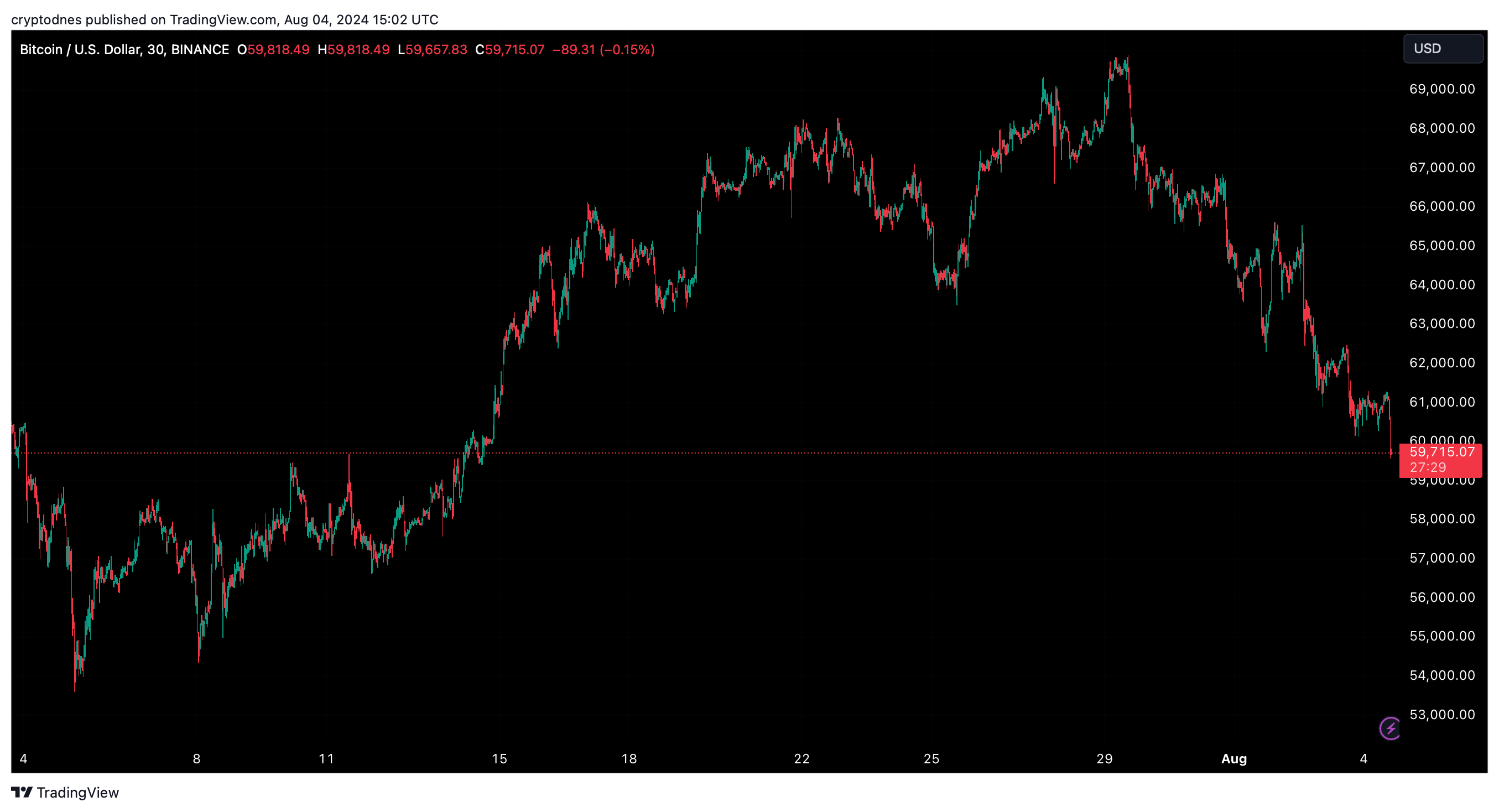Bitcoin Dropped Below $60,000 Again – What Could be the Reason?
04.08.2024 18:39 1 min. read Alexander Stefanov
Bitcoin (BTC) saw a significant drop over the weekend, with the token price trying to get back above $60,000.
According to “RLinda,” a crypto trading expert at TradingView, this decline is part of a broader consolidation phase lasting five months.
Bitcoin‘ s losses over the weekend can be attributed to a combination of economic data, market sentiment, significant ETF outflows and the failure to overcome the critical $70,000 resistance level
Macroeconomic indicators played a crucial role in the price decline. The U.S. nonfarm payrolls report released on August 2 showed an increase in unemployment from 4% to 4.3% and rising inflation, which created negative market sentiment. The weak jobs report heightened fears of a recession, leading to a sell-off in Bitcoin.
Additionally, Farside data reveals significant outflows from Bitcoin ETFs, with $237.4 million in outflows on August 2 and $80.4 million for the week.
Additionally, the bankruptcy restructuring of Genesis Trading and the distribution of $4 billion in assets may have contributed to the market’s decline, worsening market sentiment due to emerging concerns of a potential sell-off.
At the time of writing, Bitcoin is trading at $59,700, reflecting a decline of 4% in the last 24 hours and over 11% in the last 7 days
 .
.
-
1
Bitcoin: What to Expect After Hitting a New All-time High
10.07.2025 14:00 2 min. read -
2
Peter Brandt Issues Cautious Bitcoin Warning Despite Bullish Positioning
10.07.2025 20:00 2 min. read -
3
Standard Chartered Becomes First Global Bank to Launch Bitcoin and Ethereum Spot Trading
15.07.2025 11:00 1 min. read -
4
Vanguard Now Owns 8% of Michael Saylor’s Strategy, Despite Calling BTC ‘Worthless’
15.07.2025 17:09 2 min. read -
5
What’s The Real Reason Behind Bitcoin’s Surge? Analyst Company Explains
12.07.2025 12:00 2 min. read
Global Money Flow Rising: Bitcoin Price Mirrors Every Move
Bitcoin is once again mirroring global liquidity trends—and that could have major implications in the days ahead.
What is The Market Mood Right Now? A Look at Crypto Sentiment And Signals
The crypto market is showing signs of cautious optimism. While prices remain elevated, sentiment indicators and trading activity suggest investors are stepping back to reassess risks rather than diving in further.
What Price Bitcoin Could Reach If ETF Demand Grows, According to Citi
Citigroup analysts say the key to Bitcoin’s future isn’t mining cycles or halving math—it’s ETF inflows.
Is Bitcoin’s Summer Slowdown a Buying Opportunity?
Bitcoin may be entering a typical summer correction phase, according to a July 25 report by crypto financial services firm Matrixport.
-
1
Bitcoin: What to Expect After Hitting a New All-time High
10.07.2025 14:00 2 min. read -
2
Peter Brandt Issues Cautious Bitcoin Warning Despite Bullish Positioning
10.07.2025 20:00 2 min. read -
3
Standard Chartered Becomes First Global Bank to Launch Bitcoin and Ethereum Spot Trading
15.07.2025 11:00 1 min. read -
4
Vanguard Now Owns 8% of Michael Saylor’s Strategy, Despite Calling BTC ‘Worthless’
15.07.2025 17:09 2 min. read -
5
What’s The Real Reason Behind Bitcoin’s Surge? Analyst Company Explains
12.07.2025 12:00 2 min. read


